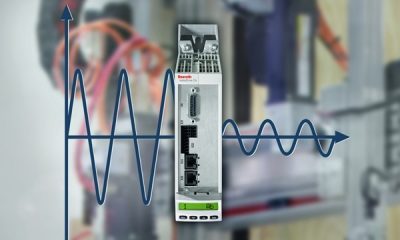
Bosch Rexroth's Adaptive Systems Increases Throughput by 50 Percent
Adaptive Systems technology minimizes unwanted movements like oscillations and vibrations, increasing process throughput by up to 50 percent.
Bosch Rexroth offers Adaptive Systems motion control technology directly at the drive level to reduce unwanted movements in industrial machinery. The technology alleviates movements including oscillations, vibrations, sloshing and sway.
Vibrations and oscillations are simple, repetitive motions, but they’re governed by complex factors of wave physics. The complex nature of waves often makes traditional vibration control methods ineffective. Because implementing vibration damping and avoidance techniques requires a control system that can quickly adapt to varying process, material and application changes, Rexroth offers Adaptive System technology directly at the drive level, rather than at the higher control level.
Less vibration not only reduces dimensional variation and damage to the product, but also permits shorter stabilization and transient times to increase machine throughput. In addition, reducing vibration reduces mechanical stress, which extends machine life.
Rexroth Adaptive System motion control can handle high-speed inputs and deterministic events with closed-loop response times. Current closure can be accomplished in 62.5 microseconds, speed loop closure in 125 microseconds, and position closure in 250 microseconds.
Rexroth Adaptive Systems technology is implemented from the company’s IndraMotion MLD drive-based motion logic controller. This platform supports all the Rexroth Adaptive System component technologies. Rexroth IndraDrive intelligent servo drives with sensors monitor the status of axis mechanics. Additionally, Rexroth Productivity Agent software uses the drive as an intelligent sensor to monitor, analyze and reduce vibrations in real time.
